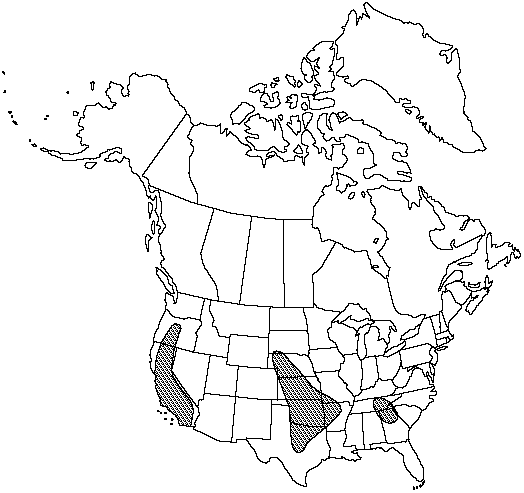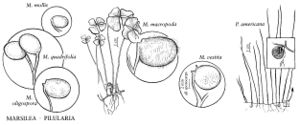Difference between revisions of "Pilularia americana"
Monatsber. Königl. Preuss. Akad. Wiss. Berlin 1863: 435. 1864.
FNA>Volume Importer |
FNA>Volume Importer |
||
| Line 49: | Line 49: | ||
|publication year=1864 | |publication year=1864 | ||
|special status= | |special status= | ||
| − | |source xml=https://jpend@bitbucket.org/aafc-mbb/fna-data-curation.git/src/ | + | |source xml=https://jpend@bitbucket.org/aafc-mbb/fna-data-curation.git/src/f6b125a955440c0872999024f038d74684f65921/coarse_grained_fna_xml/V2/V2_745.xml |
|genus=Pilularia | |genus=Pilularia | ||
|species=Pilularia americana | |species=Pilularia americana | ||
Revision as of 18:57, 24 September 2019
Plants forming dense clones. Leaves 1.6–10.2 cm, sparsely pubescent. Sporocarp stalks attached at base of leaf, 1–3 mm. Sporocarps globose, 1.6–2.7 mm diam., covered with matted hairs until mature; raphe minute, teeth lacking. Sori 4.
Phenology: Sporocarps produced spring–fall (Apr–Oct).
Habitat: In shallow water of ponds and temporary pools and on reservoir margins
Elevation: 50–600 m
Distribution

Ala., Ark., Calif., Ga., Kans., Mo., Nebr., N.C., Okla., Oreg., S.C., Tenn., Tex., Mexico in Baja California.
Discussion
Pilularia americana also has been reported from Alaska. I have seen no vouchers from Alaska, nor have I seen the Oregon vouchers. Because of its grasslike appearance and subterranean sporocarps, P. americana is probably overlooked and more common than records indicate. The telltale circinate vernation of the leaves is the best characteristic for distinguishing it from similar plants.
Pilularia caroliniana A. Braun, an invalid name, has been used for this species and may appear on specimens.
Selected References
None.
